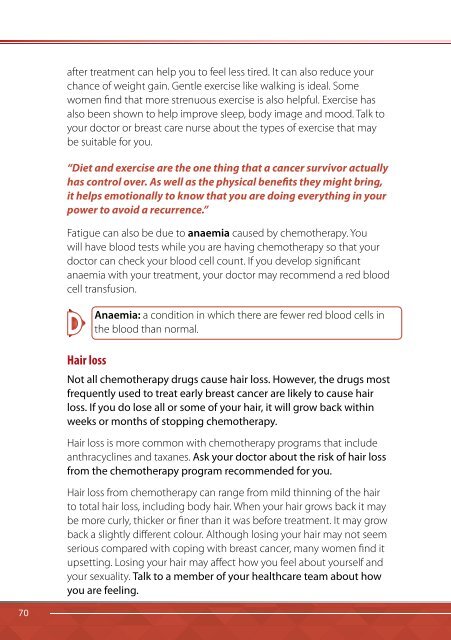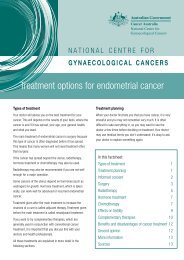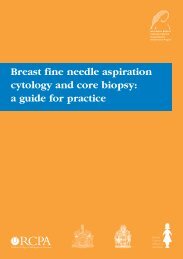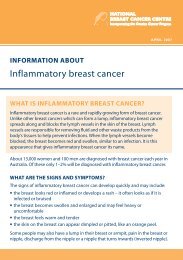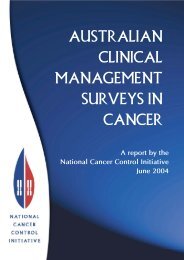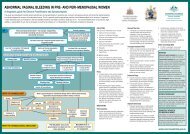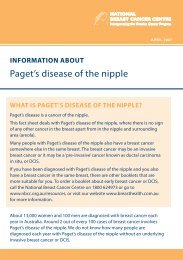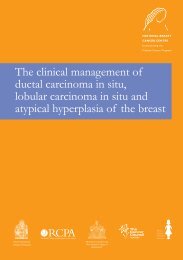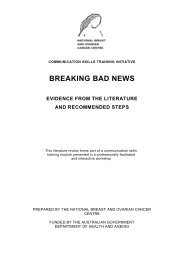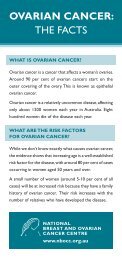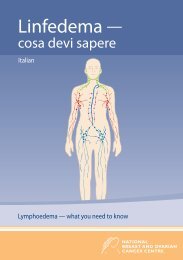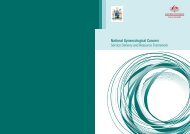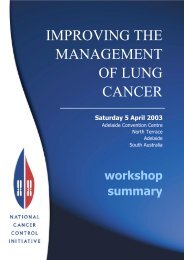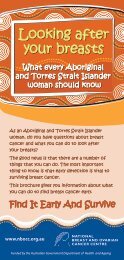- Page 1 and 2:
Endorsed by:Guide for women withear
- Page 3 and 4:
Guide for women with early breast c
- Page 5 and 6:
AcknowledgementsCancer Australia gr
- Page 7 and 8:
IntroductionWho this book is forThi
- Page 9 and 10:
Breast Cancer Network Australia’s
- Page 11 and 12:
Notes:Guide for women with early br
- Page 13 and 14:
Breast cancer: the factsThis sectio
- Page 15 and 16:
Metastasis: the name for cancer tha
- Page 17 and 18:
Cancer Australia has information fo
- Page 19 and 20:
You may like to write your own ques
- Page 21 and 22:
Breast cancer survival is measured
- Page 23 and 24:
Making sense of test resultsThis se
- Page 25 and 26:
Hormone receptorsThe report shows w
- Page 27 and 28:
Stages of early breast cancerStage
- Page 29 and 30:
You may like to write your own ques
- Page 31:
Guide for women with early breast c
- Page 34 and 35:
Surgery to the armpit (axilla) 29Su
- Page 36 and 37:
Targeted therapies 95Summary ......
- Page 38:
“I like the way my doctor treated
- Page 41 and 42:
• oncology nurse: specialises in
- Page 43 and 44:
“He said, ‘Go away and think ab
- Page 45 and 46:
Questions to ask about your treatme
- Page 47 and 48:
Breast surgeryDate of development:
- Page 49 and 50:
• Compression sleeve — this is
- Page 51 and 52: After surgery, the pathologist will
- Page 53 and 54: Side effects of breast conserving s
- Page 55 and 56: If you are at increased risk of bre
- Page 57 and 58: “After the surgery I couldn’t r
- Page 59 and 60: Rare side effects of mastectomy:•
- Page 61 and 62: Frequently asked questionsHow do I
- Page 63 and 64: If there are cancer cells in the ly
- Page 65 and 66: Things that affect whether you have
- Page 67 and 68: • numbness of the arm, shoulder,
- Page 69 and 70: The aim at this stage is to find th
- Page 71 and 72: Questions yet to be answered about
- Page 73 and 74: Frequently asked questionsWill the
- Page 75 and 76: Choosing a breast prosthesisThere a
- Page 77 and 78: For more information about breast r
- Page 79 and 80: • there is a small risk the tissu
- Page 81 and 82: • Do you specialise in breast rec
- Page 83 and 84: How safe are breast implants?The te
- Page 85 and 86: For more information about the risk
- Page 87 and 88: “If I start to feel tired I’ll
- Page 89 and 90: Other suggestions, based on the exp
- Page 91 and 92: Frequently asked questionsWill havi
- Page 93 and 94: “You can still lead a normal life
- Page 95 and 96: Combinations of chemotherapy are of
- Page 97 and 98: central catheter). This involves pu
- Page 99 and 100: The following are two examples of c
- Page 101: Common side effects of chemotherapy
- Page 105 and 106: chemotherapy. Talk to your doctor o
- Page 107 and 108: Sometimes chemotherapy can cause ot
- Page 109 and 110: Tell your doctor immediately (or go
- Page 111 and 112: If these signs develop during the n
- Page 113 and 114: You may like to write your own ques
- Page 115 and 116: Hormonal therapiesDate of developme
- Page 117 and 118: • After menopause (post-menopause
- Page 119 and 120: For more information about the side
- Page 121 and 122: Deciding about hormonal therapiesBe
- Page 123 and 124: Questions to ask about hormonal the
- Page 125 and 126: Frequently asked questionsHow do I
- Page 128 and 129: Targeted therapiesDate of developme
- Page 130 and 131: Side effects of trastuzumabThe most
- Page 132 and 133: You may like to write your own ques
- Page 134 and 135: Clinical trialsDate of development:
- Page 136 and 137: It is up to you whether you choose
- Page 138 and 139: Frequently asked questionsHow do I
- Page 140 and 141: Complementary andalternative therap
- Page 142 and 143: Cancer Council NSW has produced a b
- Page 144 and 145: Frequently asked questionsCan I tak
- Page 146 and 147: When treatment is overThis section
- Page 148 and 149: Follow-up after breast cancerDate o
- Page 150 and 151: Your follow-up schedule will be pla
- Page 152 and 153:
Breast cancer and family historyIf
- Page 154 and 155:
You may like to write your own ques
- Page 156 and 157:
LymphoedemaDate of development: Oct
- Page 158 and 159:
How to reduce the risk of lymphoede
- Page 160 and 161:
How is lymphoedema managed?There is
- Page 162 and 163:
There are a range of alternative tr
- Page 164 and 165:
• Can you refer me to a qualified
- Page 166 and 167:
Frequently asked questionsHow commo
- Page 168 and 169:
Symptoms of menopauseWhether your m
- Page 170 and 171:
Although hormonal therapies for bre
- Page 172 and 173:
Questions to ask about the effect o
- Page 174 and 175:
Frequently asked questionsIs it saf
- Page 176 and 177:
It can be helpful to talk to your f
- Page 178 and 179:
You may like to write your own ques
- Page 180 and 181:
36Notes:
- Page 182 and 183:
Finding supportDate of development:
- Page 184 and 185:
“Certainly after the diagnosis I
- Page 186 and 187:
Your partnerMany partners also find
- Page 188 and 189:
• Give simple, honest answers to
- Page 190 and 191:
Same sex couplesYou may feel that a
- Page 192 and 193:
Depending on your situation and whe
- Page 194 and 195:
Frequently asked questionsHow do I
- Page 196 and 197:
Cancer Council Australia: www.cance
- Page 198 and 199:
GlossaryAdjuvant:Alkylating agent:A
- Page 200 and 201:
Ductal carcinoma in situ non-invasi
- Page 202 and 203:
Mammogram:Mastectomy:Metastasis:Mit
- Page 204 and 205:
Transverse rectus a type of breast


